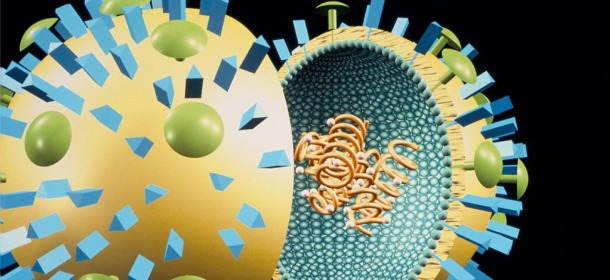Featured
Major Threats from Universal Flu Vaccine
The upcoming universal influenza vaccine will be carrying at least two threats: nanoparticles and a potentially new autoimmune disorder. Yet nothing stops the development of these dangerous products intended to be applied to virtually everyone, whether healthy or not. In the end, it becomes obvious that it’s not nice to fool Mother Nature!

Influenza Virus, by Sanofi Pasteur
Reports of a major advance in developing a universal influenza vaccine have provided information that clarifies the utter recklessness inherent in the vaccine industry. Two significant risks to heath will be part of every injection: nanoparticles and autoimmune disorders.
The new technique involves fusing two proteins, haemagglutinin (HA) found on the surface membranes of flu viruses and ferritin. These particles are grown through genetic engineering of bacteria, and according to the journal Nature[1,2]:
[T]he HA–ferritin complexes automatically assembled into a structure with a 24-piece ferritin core from which protruded eight three-piece HA spikes, mimicking the natural HA spikes in the flu virus coat.
The genetically engineered particles contain a core of 24 ferritin proteins with 8 spikes containing 3 HA proteins. They are believed to be similar to the HA spikes found on viruses, but the HA is described by the lead researcher, Gary Nabel, as more loosely packed than on a natural virus. These HA proteins are believed to act as antigens.
The concept is that these HA spikes are the same on a range of influenza types, so the vaccine, though not actually universal, would be effective against a large group of flu viruses. There are a total of 17 different HA variations in viruses. The H in flu names, such as H1N1 (swine flu) or H5N1 (bird flu of 2004), refers to haemagglutinin. The theory is that all type H1 flu viruses could respond to an H1 vaccine, but H2, H3, and others would not.
The New Risks
Initially, it sounds good. You would be able to get a single vaccine for a range of influenza viruses, not just single vaccines that are simply guesses at which variety you’re likely to come in contact with. That would appear to mean fewer vaccinations and, thus, fewer risks. But don’t be so sure.
To begin with, we know that vaccines don’t last more than a few years, so repeat vaccinations are a surety. On top of that, vaccines would be developed for each HA type. While not all types are known to infect humans, you can easily imagine the push for “just in case” vaccines—”just in case it jumps to humans”. So would there be fewer vaccinations? Not likely.
But the potential risk is far greater than just the number of vaccinations to which each person might be subjected. There are two new risks that these “universal” vaccines would bring about: nanoparticles and autoimmune disorders.
Nanoparticles
Nanoparticles are simple bits of matter that are very small, measured in terms of billionths (nano) of a meter. There’s been little research into their potential health risks, but what does exist is not comforting. Nanoparticles can easily pass through both the blood-brain barrier, indicating potential risk to the central nervous system, and the blood-testes barrier, indicating potential risk to the male reproductive system.[3] They have been documented to cause lung damage.[4,5]
While we don’t know much about nanoparticle risks to human health, we know enough that such risk does exist and that their ability to pass the blood-brain barrier indicates that the potential nature of health risk is very high. Clearly, introducing nanoparticles through injections is taking enormous risks with the public’s health.
Autoimmune Disease
Autoimmune diseases are becoming rampant, and as demonstrated many times on Gaia Health, many can be traced back to vaccines. The nature of an autoimmune disorder is disruption of the immune system, making it see normal tissues as enemies to be attacked and destroyed. Multiple sclerosis and rheumatoid arthritis are two obvious examples. In multiple sclerosis, the immune system attacks the myelin that covers and protects nerves.
Rheumatoid arthritis is caused by the immune system attacking and destroying joint cartilage, and is known to be induced by vaccine adjuvants that contain oil, such as squalene. An animal equivalent to rheumatoid arthritis is routinely created in lab animals by the injection of oil-based Freund’s adjuvant, so there’s no doubt that the risk is known.
Ferritin is a natural substance that’s ubiquitous in the human body—and it’s the basis of the new “universal” influenza vaccine. Injecting ferritin, almost certainly with an adjuvant designed to increase the immune response, must carry the risk of autoimmune disorders involving activation of the immune system against it.
As an analog, consider antiphospholipid syndrome (APS). It is known to be associated with tetanus vaccinations, but has been on the increase.[6] APS affects every part of the body and is a condition of the immune system attacking phospholipids, which are building blocks of the body.
Ferritin is required for the regulation of iron balance. It holds iron molecules inside cells until they’re needed, and then releases them. If the immune system is keyed to attack ferritin, then the ability to maintain iron homeostasis will be lost.[7,8]
Trying to Fool Mother Nature
It seems that medical science has taken on the hubristic notion that it’s possible to fool Mother Nature. But as that old advertisement for margarine so humorously—and with unintended satire—said, “It’s not nice to fool Mother Nature!” It’s not only not nice, it’s dangerous. The massive attack on human health that’s been brought forth with vaccines is costing us dearly. Chronic diseases are rampant. Diseases, such as diabetes and autism, that not long ago were almost unknown in children, are now at epidemic proportions. While it’s not possible to pin all chronic ill health on vaccines, evidence demonstrates that they’re a significant part of the cause, and very likely a primary trigger.
Autoimmune disorders are at epidemic proportions, and most, such as multiple sclerosis, lupus erythematosus, and rheumatoid arthritis, can be tied to vaccines.
Yet, rather than being cautious, medicine and its associated science has pulled out all the stops. Instead of putting resources into investigating the causes of rampant chronic disease, there’s been a gung-ho push to find yet more methods of producing vaccines. If a vaccine can be developed more quickly, then it’s termed a great advance. If a vaccine can be produced more cheaply, we’re supposed to line up with bare arms held out for the injected annointment.
But trying to fool Mother Nature is not only not nice, it’s also foolish. We’re left with more and more chronic disease. The average child is now sick. It’s such a recent development that the full extent of harm is unknown. But we do know that the burden of caring for the sick and disabled is not maintainable. It’s fairly obvious that length of life is now becoming shorter, that children now growing up cannot expect to realize long lives—and many will likely die long before reaching old age.
Is this the world we really want to see? If we continue along these lines, bowing at the altar of medical science and refusing to question every edict based on the “evidence-based” claim, it’s fairly obvious where we’re headed—and that we’re dooming our children to shortened, miserable, and unfulfilling lives. Mother Nature isn’t being fooled.
Sources:
- ‘Universal’ flu vaccine effective in animals
- Self-assembling influenza nanoparticle vaccines elicit broadly neutralizing H1N1 antibodies
- Are Silver Nanoparticles Harmful?
- Health Risks Of Nanotechnology: How Nanoparticles Can Cause Lung Damage, And How The Damage Can Be Blocked
- Nanoparticles – known and unknown health risks
- Tetanus Vaccine Causes New Disease: New Vaccines Worse?
- Iron Use and Storage in the Body: Ferritin and Molecular Representations
- Serum Ferritin
- Self-Assembled Ferritin Nanoparticles Expressing Hemagglutinin as an Influenza Vaccine
- Scientists create new flu vaccine that works against many different strains of the virus
- Universal vaccine a few steps closer
Tagged big pharma, conventional medicine, flu vaccine, fool mother nature, influenza vaccine, modern medicine, mother nature, not nice to fool mother nature, pharmaceutical drugs, pharmaceuticals, science, Self-assembling influenza nanoparticle vaccines elicit broadly neutralizing H1N1 antibodies, threats from universal flu vaccine, universal flu vaccine, universal flu vaccine autoimmune disorder, universal flu vaccine nanoparticles, universal flu vaccine study, vaccine, vaccines, vaccines autoimmune disorders, vaccines nanotechnology
Related Posts
-
Parappa Rapper













